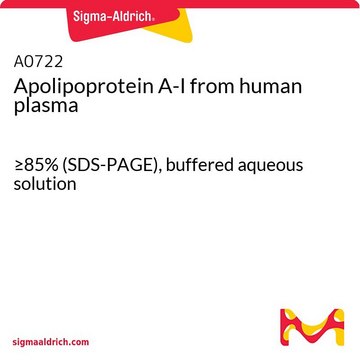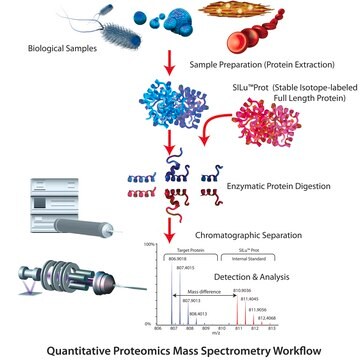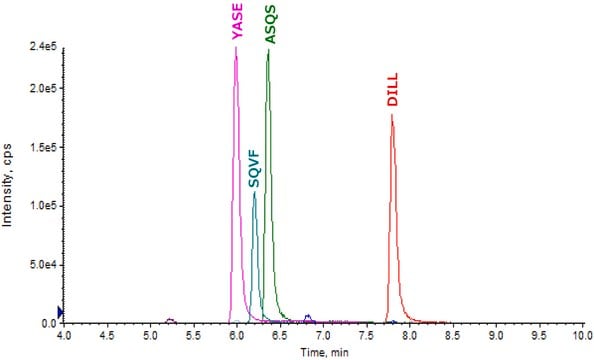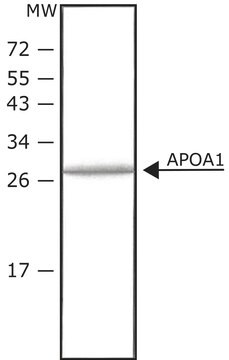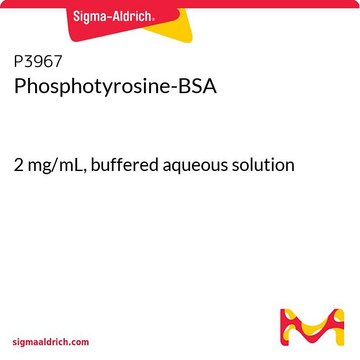MSST0001
SILu™Prot APOA1, Apolipoprotein A-1 human
recombinant, expressed in HEK 293 cells, SIL MS Protein Standard, 13C- and 15N-labeled
Synonym(s):
SILu™Prot Apolipoprotein A-1
About This Item
Recommended Products
biological source
human
Quality Level
recombinant
expressed in HEK 293 cells
tag
His tagged
V5 tagged
assay
≥98% (SDS-PAGE)
form
lyophilized powder
packaging
vial of ≥10 μg (Lot-specific vial content given on certificate of analysis)
technique(s)
mass spectrometry (MS): suitable
UniProt accession no.
storage temp.
−20°C
Gene Information
human ... APOA1(335)
Related Categories
General description
Application
Characterization of Heavy Recombinant Proteins for Use as Internal Standards in Quantitative MS Workflows
Characterization of stable isotope labeled APO-A1 for use as an internal standard in a quantitative MS workflow
Characterization of Clinically-Relevant Stable Isotope Labeled Recombinant Proteins for Use as Internal Standards in Quantitative MS Workflows
Physical form
Preparation Note
Storage and Stability
Analysis Note
SILu™Prot ApoA−Ι is a recombinant, stable isotope-labeled human Apo A1 which incorporates [13C6, 15N4]-Arginine and [13C6, 15N2]-Lysine. Expressed in human 293 cells, it is designed to be used as an internal standard for bioanalysis of ApoA1 in mass-spectrometry. SILu Prot Apo A-Ι is a monomer of 280 amino acids (including C-terminal polyhistidine and V5 tags), with an apparent molecular weight of 32.3 kDa.
Sequence
RHFWQQDEPPQSPWDRVKDLATVYVDVLKDSGRDYVSQFEGSALGKQLNLK
LLDNWDSVTSTFSKLREQLGPVTQEFWDNLEKETEGLRQEMSKDLEEVKAKV
QPYLDDFQKKWQEEMELYRQKVEPLRAELQEGARQKLHELQEKLSPLGEEM
RDRARAHVDALRTHLAPYSDELRQRLAARLEALKENGGARLAEYHAKATEHLSTLSEK
AKPALEDLRQGLLPVLESFKVSFLSALEEYTKKLNTQSDPSRGPFEGK
PIPNPLLGLDSTRTGHHHHHHHHGGQ
The N-terminal signal peptide and C-terminal linker peptide, V5 and polyhistidine tags are italicized. Suggested transitions for three peptides (bolded) are used for selected reaction monitoring analysis (SRM).
Label Incorporation
≥ 98% as determined by mass spectrometry
Other Characterization
- Sequence confirmed by intact mass analysis
- Identity verified by peptide mapping
- Purity >98% by SDS-PAGE
- Vial content was determined by the Bradford method using BSA as a calibrator. The correction factor of Bradford-to-AAA is 88.33%
Suggested Quantitative Analysis Parameters
(MRM settings provided for three suggested peptides)
Legal Information
Storage Class
11 - Combustible Solids
wgk_germany
WGK 2
flash_point_f
Not applicable
flash_point_c
Not applicable
Choose from one of the most recent versions:
Certificates of Analysis (COA)
Don't see the Right Version?
If you require a particular version, you can look up a specific certificate by the Lot or Batch number.
Already Own This Product?
Find documentation for the products that you have recently purchased in the Document Library.
Our team of scientists has experience in all areas of research including Life Science, Material Science, Chemical Synthesis, Chromatography, Analytical and many others.
Contact Technical Service
